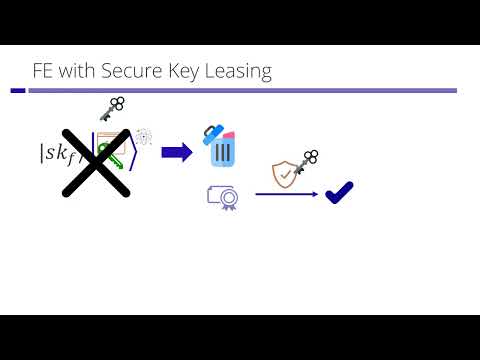CryptoDB
Functional Encryption with Secure Key Leasing
| Authors: |
|
|---|---|
| Download: | |
| Presentation: | Slides |
| Conference: | ASIACRYPT 2022 |
| Abstract: | Secure software leasing is a quantum cryptographic primitive that enables us to lease software to a user by encoding it into a quantum state. Secure software leasing has a mechanism that verifies whether a returned software is valid or not. The security notion guarantees that once a user returns a software in a valid form, the user no longer uses the software. In this work, we introduce the notion of secret-key functional encryption (SKFE) with secure key leasing, where a decryption key can be securely leased in the sense of secure software leasing. We also instantiate it with standard cryptographic assumptions. More specifically, our contribution is as follows. - We define the syntax and security definitions for SKFE with secure key leasing. - We achieve a transformation from standard SKFE into SKFE with secure key leasing without using additional assumptions. Especially, we obtain bounded collusion-resistant SKFE for P/poly with secure key leasing based on post-quantum one-way functions since we can instantiate bounded collusion-resistant SKFE for P/poly with the assumption. Some previous secure software leasing schemes capture only pirate software that runs on an honest evaluation algorithm (on a legitimate platform). However, our secure key leasing notion captures arbitrary attack strategies and does not have such a limitation. As an additional contribution, we introduce the notion of single-decryptor FE (SDFE), where each functional decryption key is copy-protected. Since copy-protection is a stronger primitive than secure software leasing, this notion can be seen as a stronger cryptographic primitive than FE with secure key leasing. More specifically, our additional contribution is as follows. - We define the syntax and security definitions for SDFE. - We achieve collusion-resistant single-decryptor PKFE for P/poly from post-quantum indistinguishability obfuscation and quantum hardness of the learning with errors problem. |
Video from ASIACRYPT 2022
BibTeX
@inproceedings{asiacrypt-2022-32600,
title={Functional Encryption with Secure Key Leasing},
publisher={Springer-Verlag},
author={Fuyuki Kitagawa and Ryo Nishimaki},
year=2022
}

